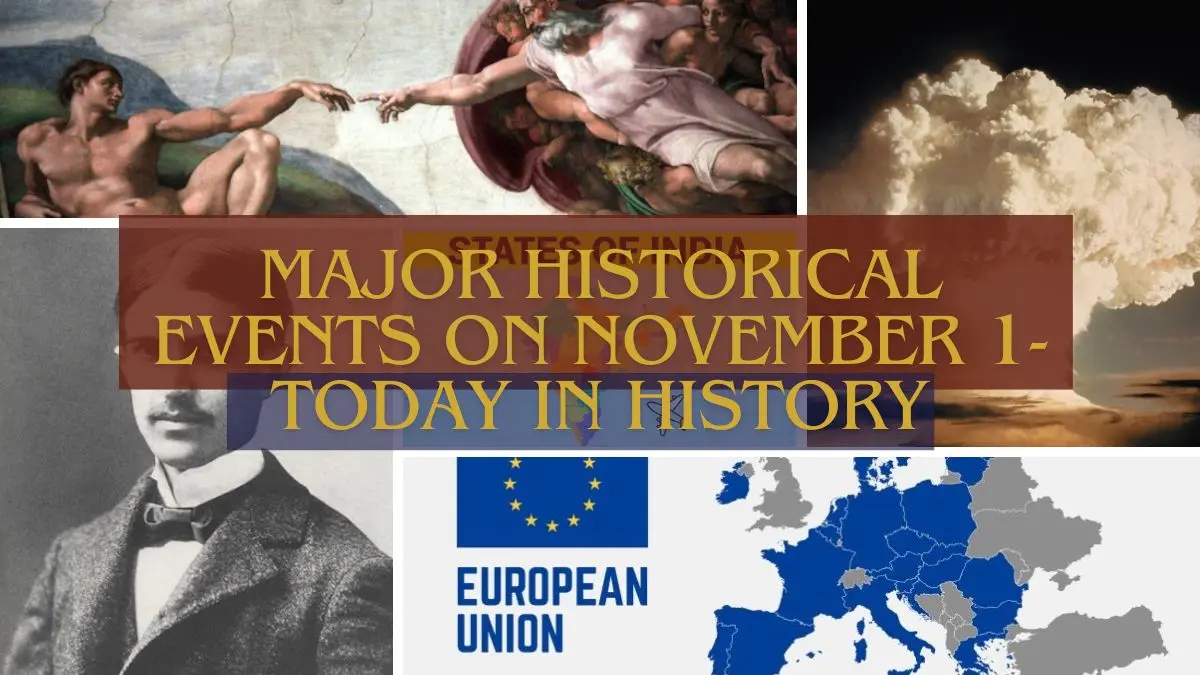November 1 has witnessed remarkable events that shaped our world in ways both monumental and subtle. From significant political milestones to scientific breakthroughs, this day in history brings a fascinating glimpse into the past. Join us as we explore some of the major historical events that took place on November 1, spanning across centuries and continents.
Major Historical Events on November 1- Today in History
The Origins of Austria’s Name – 996 AD
In a historic deed, Holy Roman Emperor Otto III granted 30 “royal hides” (about 2,000 acres) to the Bavarian bishopric of Freising. This document recorded the term “Ostarrîchi,” marking the earliest use of the name Austria.
Michelangelo’s Sistine Chapel Unveiled – 1512 AD
The public first glimpsed Michelangelo’s frescoes on the Sistine Chapel ceiling, a monumental masterpiece showcasing biblical scenes. This artwork remains one of Western art’s crowning achievements, celebrated for its beauty and detail.

Debut of Shakespeare’s The Tempest – 1611 AD
William Shakespeare’s The Tempest was performed for the first time, showcasing a tale of magic, redemption, and humanity, and marking one of his last and most admired plays.
Lisbon’s Devastating Earthquake – 1755 AD
A catastrophic earthquake struck Lisbon, destroying over 9,000 buildings and causing the death of up to 30,000 people. The disaster had lasting effects on architecture and philosophy in Europe.
The Stamp Act and Colonial Taxation – 1765 AD
The British Stamp Act was enforced, imposing taxes on American colonial documents, marking Parliament’s first direct taxation attempt and a key event leading to the American Revolution.
Stephen Crane, Author of The Red Badge of Courage, is Born – 1871 AD
American novelist Stephen Crane, famous for The Red Badge of Courage, was born. His work explored themes of war and human psychology, influencing early 20th-century American literature.

Abolition of the Sultanate in Turkey – 1922 AD
The Grand National Assembly, led by Kemal Atatürk, voted to abolish Turkey’s sultanate, ending centuries of Ottoman rule and paving the way for the modern Turkish Republic.
Seabiscuit Triumphs Over War Admiral – 1938 AD
In a Great Depression-era horse race that captivated America, Seabiscuit defeated War Admiral by four lengths, symbolizing hope and resilience for a struggling nation.
Attempted Assassination of President Truman – 1950 AD
Puerto Rican nationalists from the FALN attempted to assassinate President Harry S. Truman, drawing attention to Puerto Rico’s quest for independence.
First Hydrogen Bomb Detonated – 1952 AD
The United States conducted the first successful test of a hydrogen bomb, codenamed ‘Ivy Mike,’ at Enewetak Atoll in the Pacific Ocean, marking a significant advancement in nuclear weapons technology.

Cool Hand Luke Hits Theatres – 1967 AD
The iconic film Cool Hand Luke debuted, with Paul Newman delivering a memorable antihero performance that defined his career and added depth to the American antihero archetype.
Birth of Aishwarya Rai Bachchan – 1973 AD
Aishwarya Rai Bachchan, Indian actress and global beauty icon, was born. Known for her remarkable career and winning Miss World, she remains an influential figure in film and philanthropy.
Independence of Antigua and Barbuda – 1981 AD
Antigua and Barbuda gained independence from the UK, with Vere Bird as its first prime minister, beginning a new era of self-governance for the Caribbean nation.
Formation of the European Union – 1993 AD
The Maastricht Treaty took effect, formally establishing the European Union and fostering greater economic and political integration across Europe.

NASA’s Wind Mission to Explore Solar Space – 1994 AD
NASA launched the Wind spacecraft, designed to orbit between the Sun and Earth, studying the solar wind and advancing our understanding of space’s impact on Earth.
Titanic Makes Its First Public Appearance – 1997 AD
James Cameron’s Titanic had its debut screening in Tokyo, later becoming one of the highest-grossing films ever and propelling Leonardo DiCaprio and Kate Winslet to stardom.
Football Legend Walter Payton Passes Away – 1999 AD
Walter Payton, one of NFL’s greatest running backs, succumbed to bile duct cancer, leaving a legacy of athletic excellence and charitable contributions.
Chhattisgarh Becomes India’s 26th State – 2000 AD
Chhattisgarh was officially formed as the 26th state of India, carved out from the eastern districts of Madhya Pradesh, enhancing administrative efficiency and local governance.

Death of Author William Styron – 2006 AD
Celebrated American novelist William Styron, known for his rich prose and tragic themes in works like Sophie’s Choice, passed away at 81, leaving a lasting impact on literature.
Also Read: Major Historical Events on October 31- Today in History









